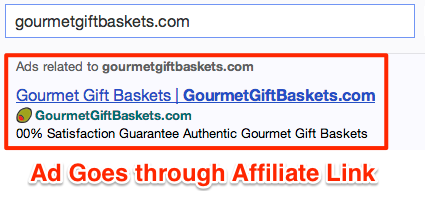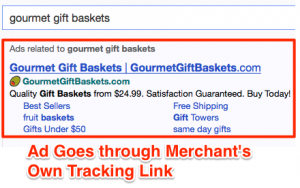Yahoo made an interesting move a few years ago by introducing branded favicons for certain paid listings. The concept made a lot of sense at the time (and to this day). Not only would the new visual element encourage clicks—it would also add a level of trust for the searcher. Considering the potential for brand confusion with search ads (via tactics like ad hijacking, search arbitrage, and various other forms of trademark abuse), this was a win-win for brands and consumers alike. Brands could make themselves stand out. Consumers could be assured that they were heading to their intended destination.
Eventually these ads became known as Rich Ads in Search. A number of formats were added, and in 2012 they were expanded to Bing search as well. These new formats include additional features such as deeplinks, images and even video. All of them follow the same core principle: create additional brand authority on the SERP. Overall, that's great for brands. But what happens when an affiliate takes over and hijacks a brand with these Rich Ads? Here's an example we found on Yahoo of an affiliate directly linking to a merchant's site using Rich Ads:
In this case, the extra branding on the SERP has a negative impact for the merchant. By attracting more attention to the ad (and likely more clicks), the affiliate can skim away extra commissions on these searches. What was originally intended to improve the brand's presence in PPC is actually being used against it!
Brand Ad vs. Affiliate Ad
The affiliate seems to be specifically targeting variations of the brand's domain name. Compare the affiliate ad from above with the brand's actual ad below:
A few differences immediately jump out. First off, the brand's ad includes deeplinks. It's unclear why the affiliate would pass these up—but it's certainly possible that they simply haven't updated their ad in a while. After all, the second obvious difference between the two ads doesn't suggest much attention to detail. The affiliate's ad copy touts a "00% Satisfaction Guarantee" (not exactly the world's most enticing offer) as opposed to the "Quality Gift Baskets from $24.99" that the brand itself promotes.
You can test this out yourself by swinging over to Yahoo and searching for "Gourmet Gift Baskets" and then for "gourmetgiftbaskets.com". The first search should show the brand's ad. The second search should show the affiliate's ad, complete with the "00% Satisfaction Guarantee" copy.
Although it may be tempting to make snide remarks about the error, I think it's actually more interesting to consider what issues this ad could pose without the typo. Sure, 0% satisfaction doesn't reflect very well on the brand. But what if it had indeed said 100% and a customer decided to take them up on it? While in this case the brand actually supports such an offer, this could really start to get ugly if they didn't. The brand would potentially be on the hook for a guarantee that they never promised.
A Vulnerable Format
When Bing rolled out Rich Ads in Search (RAIS), it limited them to a subset of premium advertisers. That restriction alone should be enough to prevent affiliate hijackers from abusing brands via RAIS. Notably, we didn't find any Rich Ad hijacks for this particular brand on Bing. But on Yahoo, it seems that we have a very different story (barring the unlikely possibility of this affiliate being a premium advertiser).
If you were under the impression that Rich Ads were handled the same way on Yahoo as they are on Bing (an assumption which I mistakenly made), this is some unfortunate news. Yahoo is not safe from RAIS-based abuse. Furthermore, if Bing follows suit with Yahoo and opens them up to all accounts, we could really start to see some rampant abuse. After all, Rich Ads must be quite attractive for affiliate hijackers. They increase brand recognition and encourage additional clickthrough, drawing free organic clicks away from the brand and enabling a blackhat to insert their affiliate link in the process.


